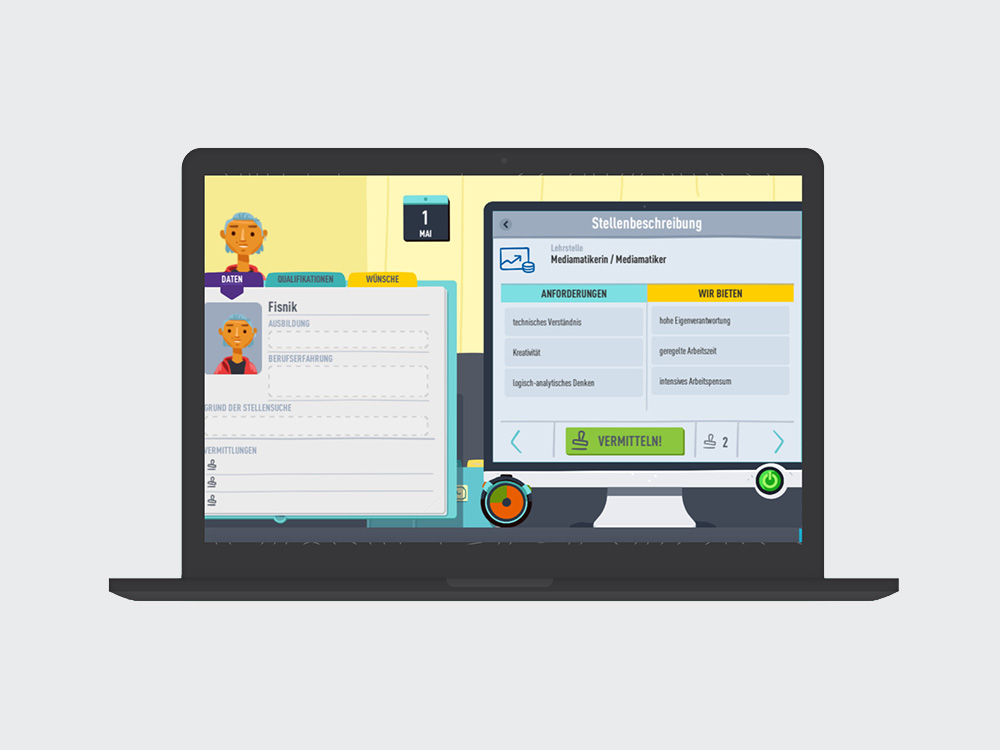A fun way to the perfect career.
Text: Béatrice Koch
The digital tool “like2be” helps young adults learn even more about familiar jobs and discover new career options. It also allows them to explore their personal interests – and have fun along the way.
Choosing a career is a process that starts at a very early age, explains Christopher Keller. He is a doctoral researcher at the Institute for Educational Sciences at the University of Basel (IBW), and his research focuses on serious games and game-based learning in the classroom. “As children, we tend to gravitate toward the careers of our relatives, acquaintances and other role models. We’re also influenced by the attitudes those in our social environment express about a particular profession: Is the job highly respected, is it well paid? What kinds of people normally do this job? All these factors influence our career choices later on.”
In grades six through nine – the lower secondary level – things become more serious. During these years, students lay the foundation for their professional lives. Poor academic performance and a lack of parental engagement limit their options: “That’s when a career choice can turn into a career compromise,” says Keller.
It also frequently leads to students dropping out of education altogether. Another major factor that limits career choices is gender stereotyping, which students absorb from a young age – often subconsciously.
Consequently, children’s typical dream careers haven’t changed much for generations: Little girls still want to be vets while little boys want to be astronauts or firemen. Keller emphasizes: “Even the terms ‘fireman’ or ‘stewardess’ suggest that only men or women, respectively, are allowed to do the job in question.” These stereotypes can be persistent, and they continue to lead to more young men pursuing technical careers or skilled trades while encouraging young women to opt for jobs in the social or arts sectors.
In the role of a career counselor.
To support young people through the process of choosing a career, the subject Career Orientation was added to the Swiss school curriculum, known as Lehrplan 21. That’s where like2be comes into play: Like2be is what is known as a serious game – a game that is not just for entertainment but for learning as well – and it was specially developed for students at the lower secondary level.
In this digital learning game, they slip into the role of a career counselor, studying job applications and attempting to match applicants with a suitable job or educational opportunity. Players are exposed to careers that become less and less familiar as the game progresses, and in this way, they learn that career paths aren’t always linear.
By studying the qualification profiles of the different professions, they unconsciously make connections with their own lives. “Like2be has three objectives,” says Keller: “It aims to broaden teenagers’ horizons when it comes to choosing a career, encourage them to think critically about their own professional skills, interests and wishes, and help them come to grips with gender roles and the typical gender profiles of various jobs.”
Broadening professional horizons.
To test the effectiveness of like2be, Christopher Keller performed numerous studies at the IBW. The largest study to date, conducted in 2021, gathered data from 809 participants – lower secondary students at all academic levels across six German-speaking Swiss cantons. Participants were divided into three groups: One group didn’t use like2be at all while the second group played the game without any instructions. The third group played like2be according to methodological and didactic instructions provided by teachers, used supplementary learning material and expanded on their experiences in the classroom.
According to Keller, the results of the study showed that the game fulfilled its first two objectives: “By using like2be, the students deepened their knowledge about certain careers and discovered new ones. The game also encouraged them to consider whether or not certain professions suited them.” The study didn’t provide proof of increased awareness of gender-neutral career choices to the extent that the researchers had hoped: “We suspect that the duration of use in this experiment was too short to disrupt ingrained patterns of gender stereotyping.”
Yet, the findings did show that participant learning was particularly effective when like2be was played within the framework of a methodological and didactic teaching concept. “It's important to discuss and expand upon students’ experiences with the game in the classroom,” recommends Keller. Using supplementary analog teaching materials also leads to far better learning outcomes than like2be does on its own without additional opportunities for application. Like2be not only provides young people with new insights into the professional world – it's also simply just fun: “The students really enjoyed playing it and they want the chance to play it again.”
More articles in this issue of UNI NOVA (November 2023).

